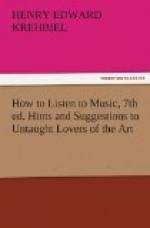[Sidenote: Past and present.]
It is interesting to note that in this respect the condition of affairs in London in the early part of the eighteenth century, which seemed so monstrously diverting to Addison, was like that in Hamburg in the latter part of the seventeenth, and in New York at the end of the nineteenth. There were three years in London when Italian and English were mixed in the operatic representations.
“The king or hero of the play generally spoke in Italian and his slaves answered him in English; the lover frequently made his court and gained the heart of his princess in a language which she did not understand.”
[Sidenote: Polyglot opera.]
At length, says Addison, the audience got tired of understanding half the opera, “and to ease themselves entirely of the fatigue of thinking, so ordered it that the whole opera was performed in an unknown tongue.”
[Sidenote: Perversions of texts.]
There is this difference, however, between New York and London and Hamburg at the period referred to: while the operatic ragout was compounded of Italian and English in London, Italian and German in Hamburg, the ingredients here are Italian, French, and German, with no admixture of the vernacular. Strictly speaking, our case is more desperate than that of our foreign predecessors, for the development of the lyric drama has lifted its verbal and dramatic elements into a position not dreamed of two hundred years ago. We might endure with equanimity to hear the chorus sing
[Sidenote: "Robert le Diable."]
“La soupe aux choux
se fait dans la marmite,
Dans la marmite on fait la
soupe aux choux”
at the beginning of “Robert le Diable,” as tradition says used to be done in Paris, but we surely ought to rise in rebellion when the chorus of guards change their muttered comments on Pizarro’s furious aria in “Fidelio” from
[Sidenote: "Fidelio."]
"Er spricht von Tod und Wunde!"
to
"Er spricht vom todten Hunde!"
as is a prevalent custom among the irreverent choristers of Germany.




